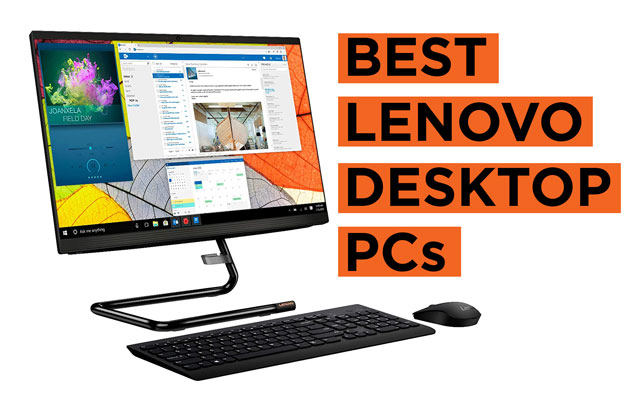This guide is for power users, creative professionals, engineers, software developers, data analysts, and anyone who demands high-throughput computing on a daily basis. If you rely on intensive workloads—rendering, simulation, compiling, multitasking across high-memory apps, or gaming at ultra settings, then you know that not every desktop can keep up. We’ve created this guide to help you find the kind of system that won’t break under pressure.
The challenge? High-performance means different things depending on the use case. A 3D modeler needs GPU bandwidth. A researcher crunching large datasets needs compute threads. A software engineer needs CPU cycles and rapid IO. So we’ve zeroed in on systems that can span disciplines without lagging in any.
This guide evaluates systems across several critical categories: CPU architecture, GPU class, RAM capacity and bandwidth, primary and secondary storage speeds, thermal integrity, motherboard chipset, PSU quality, port layout, and upgrade flexibility. Every system we include meets these baseline minimums: a 12-core processor (Intel i9 / Ryzen 9), 64GB of DDR5 RAM, 2TB NVMe PCIe Gen 4 SSD, and a high-performance GPU such as an RTX 4070 Ti or better.
We start with the CPU, the control tower for all compute operations. You should expect high multi-core performance, but not at the cost of single-thread speed. Many real-world applications, especially those involving simulation or real-time interactivity, depend on fast single-core instructions. That’s why we recommend CPUs like the AMD Ryzen 9 7950X or Intel Core i9-14900K. These chips offer an ideal mix of core count and clock speed—so you can compile, encode, calculate, and create without queueing processes.
Then comes the GPU, crucial for rendering, 3D modeling, machine learning, gaming, or video editing. You’re looking at RTX 4080, RTX 4090, or AMD Radeon RX 7900 XTX class cards here. With these, you can handle massive visual pipelines, real-time ray tracing, 4K gaming at 120fps, or multi-monitor 3D environments. They’re also essential for CUDA, Tensor, and OpenCL workflows if you work with AI or GPU-accelerated tasks.
Memory matters, not just quantity, but also speed. For high-performance desktops, 64GB of DDR5 RAM at 5600MHz or higher is the right starting point. This gives you the bandwidth to run virtual machines, load massive datasets, or work with RAW video files without system lag. Certain builds can scale up to 128GB or 192GB, which is ideal for simulation-heavy or multi-role environments.
Next up: storage. High-speed storage isn’t about capacity—it’s about not waiting. We recommend a 2TB PCIe Gen 4 NVMe SSD as your system drive, paired with an optional second SSD for projects or scratch disk usage. This setup ensures fast boot times, rapid application launches, and real-time access to large files. You avoid bottlenecks in cache read/write and also support more stable live previews in apps like Premiere Pro, Houdini, or Unreal Engine.
Motherboard choice isn’t cosmetic, it determines memory speed support, PCIe lane availability, VRM stability, and USB/Thunderbolt access. We look for systems with X670E, Z790, or WRX80 chipsets, offering robust connectivity, PCIe 5.0 support, and high-speed interfaces. That means support for multiple GPUs, 10Gb Ethernet, Wi-Fi 6E, and USB4/Thunderbolt 4, so you don’t hit a wall as your setup expands.
Expandability also defines a high-performance desktop. You want systems with multiple M.2 slots, extra DIMM slots, open PCIe lanes, and modular power supplies. You may not use all these on day one, but six months in, when you want to drop in an extra drive or add a capture card, you’ll be glad your system planned for growth.
Let’s also call out power delivery. A true performance rig needs at least a 1000W PSU, preferably Platinum-rated, to provide stable, clean power to power-hungry GPUs and multi-core CPUs. Underpowered PSUs cause crashes, limit GPU boost clocks, and wear out over time.
So what should you expect from these systems? They boot instantly. They don’t stutter under load. They render in minutes, not hours. They let you run parallel workflows without interruption: editing, encoding, simulating, and exporting. This is about sustained, predictable performance across demanding workloads.
You can also take a look at the Best Ryzen Desktop Computers in addition to the Best Intel Core i9 Desktop PCs.
These are the Best 2026 High Performance Desktop Computers:
Contents
- Skytech Gaming Azure PC Desktop – AMD Ryzen 7 7800X3D 4.2 GHz, NVIDIA RTX 4090, 1TB NVME Gen4 SSD, 32GB DDR5
- iBUYPOWER Y40 Black Gaming PC Computer Desktop Y40BI7N47S01 (Intel Core i7 14700F, RTX 4070 Super 12GB, 32GB
- Corsair Vengeance a8100 Series Gaming PC - Liquid Cooled AMD Ryzen 9 7950X CPU - NVIDIA GeForce RTX 4090 GPU
- Corsair Vengeance i7400 Series Gaming PC - Liquid Cooled Intel® Core™ i7 13700K CPU - NVIDIA® GeForce RTX™ 4070 Graphics - 32GB
- HP OMEN 45L Gaming Desktop, 13th Generation Intel Core i9-13900KF, 16 GB RAM, 1 TB Solid State Drive, NVIDIA GeForce RTX 4070 Ti
- Thermaltake AH-370 Liquid-Cooled PC (AMD Ryzen 7 3700X, RTX 3070, 16GB RGB 3600Mhz DDR4 ToughRAM RGB Memory, 1TB
Skytech Gaming Azure PC Desktop – AMD Ryzen 7 7800X3D 4.2 GHz, NVIDIA RTX 4090, 1TB NVME Gen4 SSD, 32GB DDR5 |
|
|---|---|
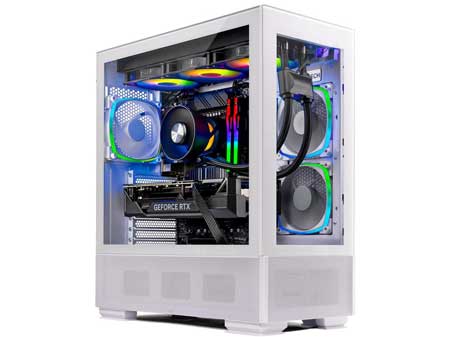 See This On Amazon |
|
| CPU | AMD Ryzen 7 7800X3D |
| Processor Speed | 4.2 GHz |
| GPU | NVIDIA RTX 4090 |
| Graphics Card Memory | 24 GB |
| RAM | 32GB DDR5 |
| Storage Space | 1TB NVME Gen4 SSD |
| Operating System | Windows 11 |
| Dimensions | 26 x 24.7 x 14.55 inches |
| Keyboard & Mouse | Sold Separately |
| Computer Monitor | Sold Separately |
| Advantages | Performance |
| Disadvantages | Price |
iBUYPOWER Y40 Black Gaming PC Computer Desktop Y40BI7N47S01 (Intel Core i7 14700F, RTX 4070 Super 12GB, 32GB |
|
|---|---|
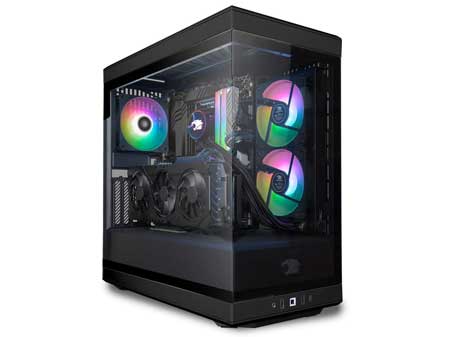 See This On Amazon |
|
| CPU | Intel Core i7 14700F |
| Processor Speed | 2.1 GHz |
| GPU | RTX 4070 Super |
| Graphics Card Memory | 12GB |
| RAM | 32GB DDR5 |
| Storage Space | 2TB NVMe SSD |
| Operating System | Windows 11 |
| Dimensions | 17.28 x 9.44 x 18.58 inches |
| Keyboard & Mouse | Included |
| Computer Monitor | Sold Separately |
| Advantages | Performance, Design and Build, Price |
| Disadvantages | None |
Corsair Vengeance a8100 Series Gaming PC - Liquid Cooled AMD Ryzen 9 7950X CPU - NVIDIA GeForce RTX 4090 GPU |
|
|---|---|
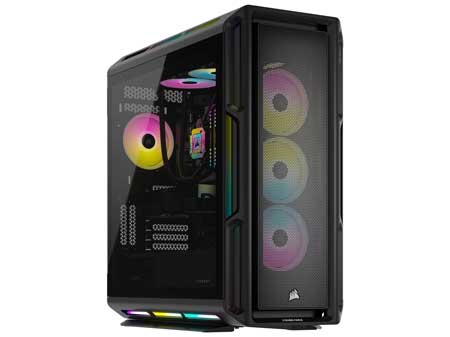 See This On Amazon |
|
| CPU | AMD Ryzen 9 7950X |
| Processor Speed | 4.5 GHz |
| GPU | NVIDIA GeForce RTX 4090 GPU |
| Graphics Card Memory | 24 GB |
| RAM | 64GB |
| Storage Space | 4TB (2X 2TB) M.2 SSD |
| Operating System | Windows 11 |
| Dimensions | 25.63 x 24.25 x 13.86 inches |
| Keyboard & Mouse | Sold Separately |
| Computer Monitor | Sold Separately |
| Advantages | Performance, storage |
| Disadvantages | n/a |
Corsair Vengeance i7400 Series Gaming PC - Liquid Cooled Intel® Core™ i7 13700K CPU - NVIDIA® GeForce RTX™ 4070 Graphics - 32GB |
|
|---|---|
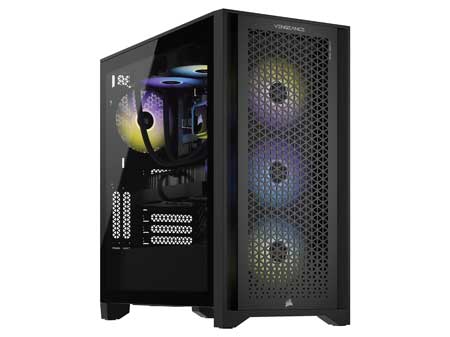 See This On Amazon |
|
| CPU | Intel® Core™ i7 13700K |
| Processor Speed | 3.6 GHz |
| GPU | NVIDIA® GeForce RTX™ 4070 |
| Graphics Card Memory | 12 GB |
| RAM | 32GB |
| Storage Space | 1TB M.2 NVMe SSD |
| Operating System | Windows 11 |
| Dimensions | 17.8 x 9.1 x 18.3 inches |
| Keyboard & Mouse | Sold Separately |
| Computer Monitor | Sold Separately |
| Advantages | Performance, |
| Disadvantages | Storage |
HP OMEN 45L Gaming Desktop, 13th Generation Intel Core i9-13900KF, 16 GB RAM, 1 TB Solid State Drive, NVIDIA GeForce RTX 4070 Ti |
|
|---|---|
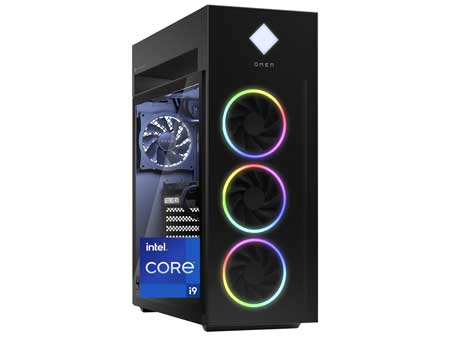 See This On Amazon |
|
| CPU | Intel Core i9-13900KF |
| Processor Speed | up to 5.80 GHz |
| GPU | NVIDIA GeForce RTX 4070 Ti |
| Graphics Card Memory | 12GB |
| RAM | 32 GB DDR5 |
| Storage Space | 1 TB 1 TB PCIe NVMe M.2 SSD |
| Operating System | Windows 11 |
| Dimensions | 8.03 x 18.5 x 21.85 inches |
| Keyboard & Mouse | Sold Separately |
| Computer Monitor | Sold Separately |
| Advantages | Low power use, Looks good, powerful |
| Disadvantages | Quite expensive |
Thermaltake AH-370 Liquid-Cooled PC (AMD Ryzen 7 3700X, RTX 3070, 16GB RGB 3600Mhz DDR4 ToughRAM RGB Memory, 1TB |
|
|---|---|
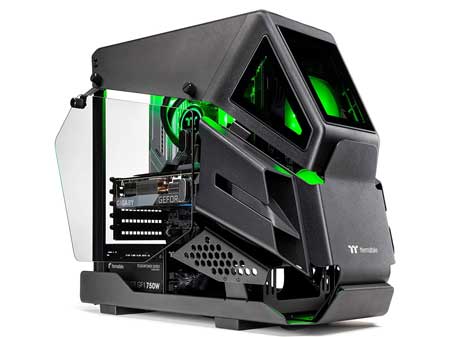 See This On Amazon |
|
| CPU | AMD Ryzen 7 3700X |
| Processor Speed | 3.6 GHz |
| GPU | RTX 3070 |
| Graphics Card Memory | 8 GB |
| RAM | 16GB |
| Storage Space | 1TB |
| Operating System | Windows 11 |
| Dimensions | 17.48 x 11.1 x 21.73 inches |
| Keyboard & Mouse | Sold Separately |
| Computer Monitor | Sold Separately |
| Advantages | Design and performance |
| Disadvantages | Storage |





